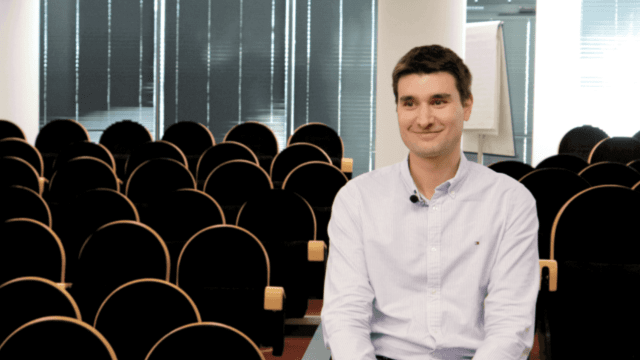Gilles Schepens’ journey in Credit Trading at Société Générale and tips for success
This article was originally published on edhec.edu - 05/03/2024
Meet Gilles Schepens, an 2017 EDHEC Alumnus from the MSc in Financial Engineering. Currently serving as a Credit Trader at Société Générale, in London, we were delighted to have him return to our Nice Campus for the Alumni Insights event. This series serves as an opportunity for alumni to share their career paths with current students of the MSc in Financial Engineering programme.
Can you share your experience in class with the students from the MSc in Financial Engineering?
It was very nice to be back on the Nice campus and meet this year’s Financial Engineering students. I received some very interesting questions and it was clear some students came prepared to the lecture which is always nice. There was a genuine interest for a career in fixed income rather than students normally being more focused on just the equity side.
Can you share some insights about your current job as a Credit Trader at Société Générale?
I work on the credit trading desk where my role involves serving as an investment-grade corporates market maker. I make markets in the Utilities, Chemicals, Pharmaceutical & Healthcare sectors and provide liquidity to the whole spectrum of clients - asset managers, insurers, pension funds, treasuries, hedge funds, central banks, etc.
How did you reach this position?
I completed a couple of internships at my previous bank. First, I worked in interest rate risk management, and later, I gained experience in interest rate risk derivatives trading. During this time, I had the opportunity to explore various desks, and I found the credit trading desk particularly intriguing. I applied for a position there and have been working as a credit trader for the past five years.
My MSc in Financial Engineering at EDHEC helped me reach my career goals. I followed high level courses on advanced derivatives, advanced fixed income, equity, and advanced risk management. They addressed various subjects, providing insights that extend beyond typical news coverage and market observations. The MSc in Financial Engineering offers a comprehensive understanding and provides numerous opportunities to explore these topics in great detail.
Did you always have a clear idea of the career path you wanted to pursue?
When I started my bachelor's degree in Belgium, I was leaning towards banking, possibly even investment banking or markets. As I completed my master’s degree, I knew I wanted to go into markets side rather than the corporate finance route. The MSc in Financial Engineering at EDHEC was precisely aligned with my career goal. In contrast to other programmes in France, the UK, Spain or elsewhere, which often provide a more holistic approach on investment banking, corporate finance and markets, EDHEC’s MSc in Financial Engineering is distinctly and intensely focused on financial markets.
Which skills and qualifications make a strong candidate for the job?
A strong interest in financial markets is crucial. It involves staying informed by reading the news, forming opinions, thinking about trade ideas, and understanding the mathematics involved. Proficiency in computer skills, especially Excel with VBA, and programming skills are essential.
On the job, the focus is going in-depth into specific matters and learning what’s relevant. From there, the emphasis shifts towards staying updated with the markets and transitioning into a more analytical role.
What soft skills are required?
While the role is analytical, involving numbers and discussions with clients not physically present, it’s essential to remember that banking is ultimately a people’s business. Effective communication is key, you need to express opinions confidently. Internally, understanding various stakeholders and tailoring your support to their needs is key to navigating the dynamic environment within the bank.
Tips for students and young graduates to prepare for their interviews:
You should always have two or three trade ideas ready! It does not matter if you are applying for a fixed-income role, and you have an equity trade idea and a commodity strategy. The key is to demonstrate that you actively consider market trends, stay updated with news, and formulate perspectives on potential trades. Additionally, you should be prepared to address straightforward questions, think on your feet, and be able to show your skills on Excel and programming when required. Eventually, you may need to showcase some Excel modelling skills and answer conceptual thinking questions before securing the job.
Can you share the importance of EDHEC’s alumni network in succeeding in your career?
The alumni network is one of the biggest privileges you get from the programme. With the alumni network, you can always find someone in a relevant position, making it easy to connect with an individual who has experience in your desired field or role.
When I think about my friends from the MSc in Financial Engineering programme and myself, we are always willing to share knowledge, insights and give helpful nudge in the right direction.
What would you tell your younger self?
Start early in everything – read about finance, learn programming and initiate job applications. Being a step ahead of the competition is crucial.

Comments0
Please log in to see or add a comment
Suggested Articles


